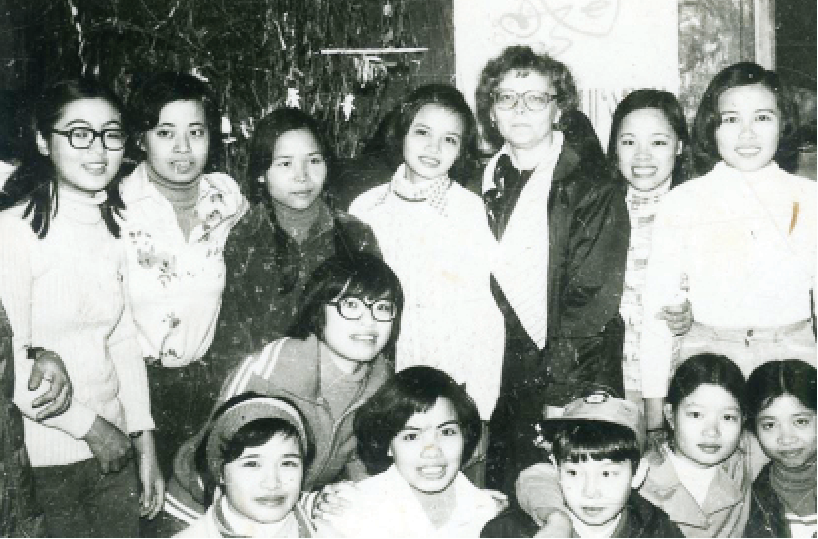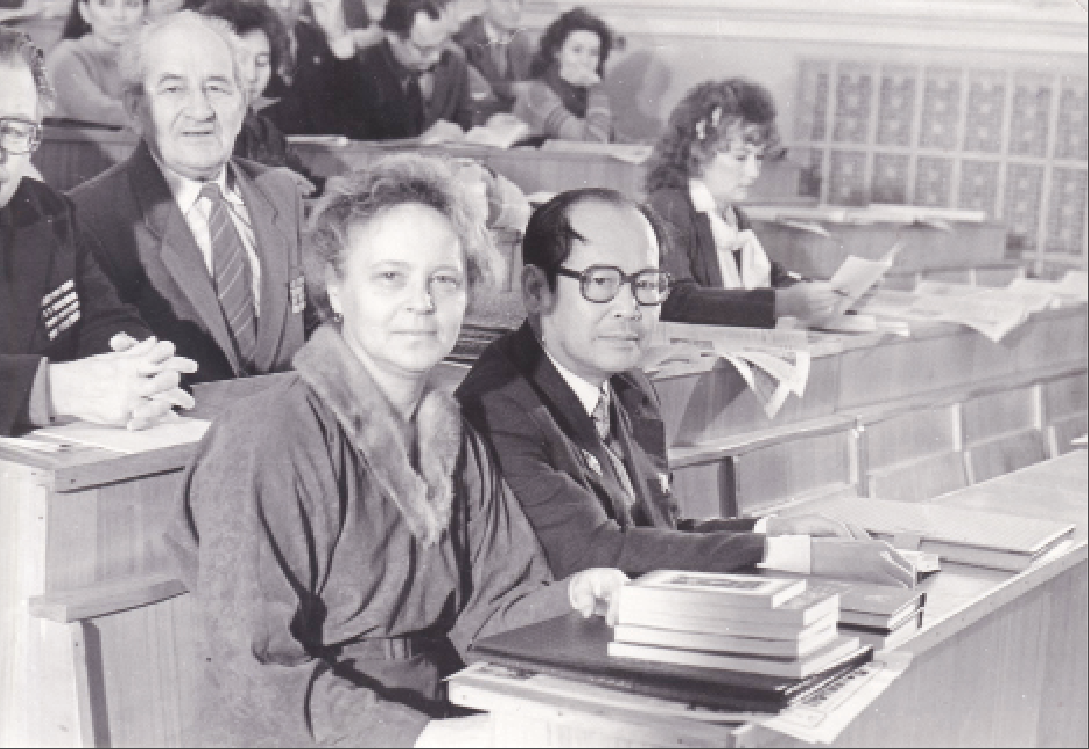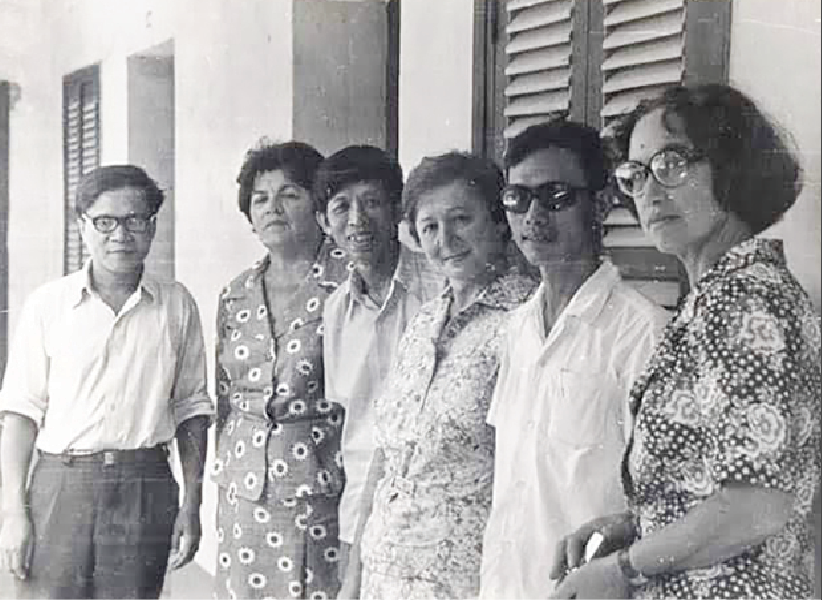I remember that time was a difficult time. Only five years had passed since the Liberation of the South and the reunification of Vietnam in 1975, before that was 30 years of waging a war for national liberation that required huge material costs, especially human efforts. But the development of the School did not stop even during that difficult time of the country. In the 60s and 70s of the 20th century, teachers and students had to temporarily leave their beloved university and evacuate to remote rural areas to avoid American bombings. Among them, many young, talented teachers and students went to the front and sacrificed for the Fatherland. However, lectures and scientific seminars, tests and exams were still conducted in parallel with teachers teaching and doing scientific research.
In the 80s of the last century, the country was still recovering economically and facing many difficulties. At that time, I worked at the Foreign Languages Department - Hanoi University. At that time, students often rode old bicycles, did not have enough to eat, and dressed shabbily and simply. Many students were sometimes late to class because they had to repair their bicycles along the way.
I still remember in 1983, our Soviet experts organized a meeting for Russian language students with a decorated Christmas tree and on the tree were placed Russian riddles like a fun crossword puzzle. One of the riddles was "No windows, no doors, but the room is full of people" - we suggested a solution with the word "HOME", and immediately the students almost unanimously shouted: "Hanoi University of Science!". In response to our confusion, the students immediately explained: "There are no windows, no doors, there are many students but the classroom is not enough, the seats are packed".
The reality was like that at that time. The lessons at the School were conducted in very harsh conditions: small, narrow classrooms with a few wooden tables, benches and old blackboards, only curtains on the windows, no doors because the School's headquarters had been heavily damaged by the war. In addition, the electricity was often cut off. On cloudy days during the rainy season, the curtains had to be drawn to let in the dim sunlight and the cold; in winter, both students and teachers had to wear gloves in class. But the diligent, hard-working students of that time in Hanoi, perhaps for me, had never been seen before. The students tried very hard to do all their homework in the most meticulous way. Although the documents were printed on yellowed pages, the textbooks were also printed on such rough, ugly paper because the study materials were not only used in the classroom but also passed from one person to another. In return, the students, with their love, memorized the poems of Pushkin, Lermontov, Esenin! Once, when we, the second-year students, read the poem “Waiting for you to come back” by Konstantin Simonov, we immediately remembered the Vietnamese translation of this poem by the famous poet To Huu. We began to compare the original with the translation, not only in terms of semantics, but also in terms of the rhythm of the verses. I was very impressed by the subtlety and accuracy in the students’ comments, their love and knowledge of poetry. It was not without reason that President Ho Chi Minh, in his meeting with poet Pavel Antokolsky, who translated the work “Prison Diary” into Russian, said that everyone in Vietnam writes poetry.
My students were interested in everything, apart from the study materials, they often asked me about the city of Kazan and Kazan State University, about the lessons and hobbies of their peers in faraway Russia. They actively participated in extracurricular activities through which we tried to awaken the scientific and creative abilities of students. They became actors when acting out scenes from DI Fonvizin's comedy "The Ignorant Man" and were very happy to feel that they knew Russian better than the illiterate Mitrofanushka. Then, with a high sense of responsibility, the students prepared well and carried out the mission of "tour guides" around Hanoi for Russian "tourists", including me. I must admit that, thanks to the help of the student guides, I got to know many old streets and sights of Hanoi, which I will always love.
Nowadays, my former students have graduated and work not only in Vietnam, but also in Moscow, St. Petersburg, Kiev and Kazan (after finishing their second year, some of them were sent here to study for a year). In many letters they sent me, they always remember Hanoi National University, the cradle that provided them with a good education and created opportunities for successful careers in many different fields where knowledge of Russian is required.
I remember my colleagues - Vietnamese Russian scholars, who worked side by side with me for 2 years at the Faculty of Foreign Languages, Hanoi National University, which 3 years ago (2018) celebrated its glorious 40th anniversary. The head of the faculty at that time was the late Associate Professor, Dr. Hoang Lai, an expert who defended his PhD thesis in Leningrad (now St. Petersburg) in 1978 and received the respect of all the staff of the Faculty of Foreign Languages. Teachers and students in the Faculty at that time who had important matters to resolve all sought the Associate Professor's opinion (whether it was a teaching issue, facilities or even family matters). Mr. Hoang Lai was very interested in the professional training of teachers of the Department of Russian Language and Literature. He also helped us Soviet experts quickly get into the rhythm of teaching, pedagogy and scientific research with our Vietnamese colleagues, not only at the Department but also at the faculty and school levels.
A few years later, in 1990, we met at the MAPRIAL International Conference (International Association of Teachers of Russian Language and Literature) in Moscow. At that time, Associate Professor Dr. Hoang Lai chaired a subcommittee of Vietnamese Russian scholars. We had the opportunity to meet and discuss with each other again as close friends and colleagues. It must be said that at Hanoi National University, I was considered as “family”.
In 1960-1961, Prof. EPBusyghin was sent by Kazan University to Vietnam to train ethnologists there. He taught a course on General Ethnology at Hanoi University and participated in a 4-month field trip to the highland villages. His ethnology textbook was published in Vietnamese. Prof. EPBusyghin was awarded a Certificate of Merit and the Friendship Medal by President Ho Chi Minh for his contributions. At the first official reception of the Board of Directors, the then Rector of Hanoi University, who was the late
Professor Phan Huu Dat, a famous historian and ethnologist, immediately asked me about Prof. EPBusyghin and recalled his field trips to the highlands.
In my memory, Professor Phan Huu Dat was a caring, thoughtful teacher, a great scientist and a wonderful Principal, who laid the first bricks for establishing and maintaining the Vietnam - Russia friendship. For us Soviet experts, he was not only concerned in work but also close in daily life. In the difficult living conditions at that time, not only the Department of Russian Literature, the Faculty of Foreign Languages but also the School Board never forgot to congratulate us on our holidays. For the first time, we were introduced to Vietnamese cuisine on Tet, were given beautiful peach blossoms according to Vietnamese tradition, and the School arranged transportation.
I also had the opportunity to meet Rector Phan Huu Dat again in Kazan in 2004, when he was invited to attend the 200th anniversary celebration of Kazan State University - a partner of Hanoi State University. The celebration's organizing committee assigned Prof. EPBusyghin and me to carefully prepare the living conditions for Prof. Phan Huu Dat. In addition to the official events, Prof. EPBusyghin personally took Prof. Phan Huu Dat to visit the University's Ethnographic Museum, to see the Gallery of Rare Objects with a rich collection of Chinese objects. Prof. Phan Huu Dat proposed to organize a meeting with Vietnamese students who were studying at Kazan State University at that time. At the meeting, he was very interested in the students' academic achievements and living conditions. Afterwards, he received a whole folder full of letters from students sent to their relatives in Vietnam.
At that time, the Russian Literature Department of Hanoi University had quite a few teachers. We were introduced to the Russian language curriculum for Vietnamese students that we had to teach. We shared the best methods in teaching Russian literature to foreign language learners. Most of the teachers of the Russian Department attended my lectures on Russian - Soviet Literature, to perfect the literary knowledge they had learned at university. I still remember very clearly Mr. Nguyen Tuan Kiet, a tall, well-proportioned man, who had participated in the battle at the front when he was very young. Mr. Kiet guided us through the basics of Vietnamese.
In 1987, Mr. Nguyen Xuan Hoa - a calm, cheerful, resourceful person who could do a lot of work - was assigned to take on the position of Head of the Department. Together with Mr. Hoa, we organized a scientific conference to celebrate the 170th anniversary of the birth of poet Taras Shevchenko at Hanoi University of Science, then published a summary of the proceedings (not printed on glossy paper but only mimeographed). During this time, Mr. Nguyen Xuan Hoa started translating Aleksandr Blok's poems and often consulted me. Later, he became a "Blok researcher" in the eyes of Vietnamese literary critics.

Thanks to the enthusiastic help of colleagues in the Department, I was fortunate to get acquainted with Russian teachers and translators of the University of Foreign Languages, including Associate Professor Vu The Khoi - one of the authors of the Russian textbook used to teach first-year students of the Department of Russian Language. Then, thanks to Vu The Khoi, I got acquainted with the translators of the work "Russian Writers" published at that time at the Literature Publishing House. Those were translators Anh Truc, Hoang Thuy Toan, Le Van Nhan and others.
In 2019, the Vietnam Writers Association invited me to attend the International Conference on Promoting Vietnamese Literature to the World in Hanoi, I had the opportunity to return here. Life in Vietnam has changed, Hanoi has become modern but still preserves its national identity.
In December 1993, Hanoi University of Science was separated into the University of Natural Sciences and the University of Social Sciences and Humanities under Vietnam National University, Hanoi and has achieved many great achievements.
I wish my beloved Hanoi National University, in the year of its 65th anniversary, continued success in training young teachers and scientists, scientific development and prosperity, and strengthening relations with many universities of the Russian Federation in the spirit of the Joint Statement on the Vision of the Comprehensive Strategic Partnership between the Socialist Republic of Vietnam and the Russian Federation until 2030 between President of the Russian Federation Vladimir Putin and President Nguyen Xuan Phuc on November 30, 2021.
"Russia and Vietnam are determined to strengthen cooperation in education - training and science - technology, considering this one of the key cooperation directions between the two countries."


